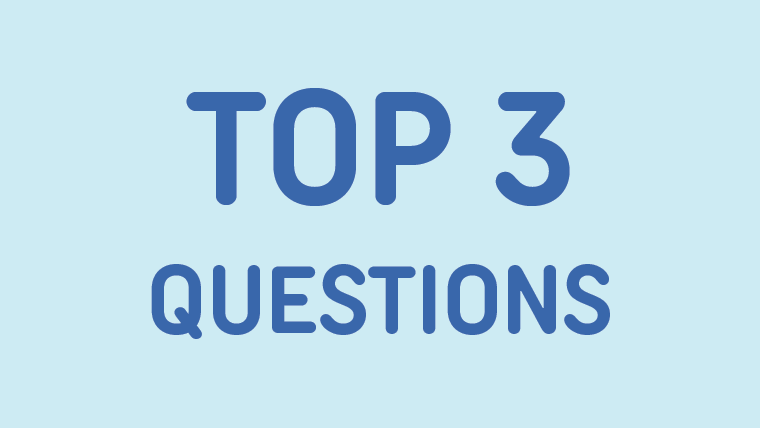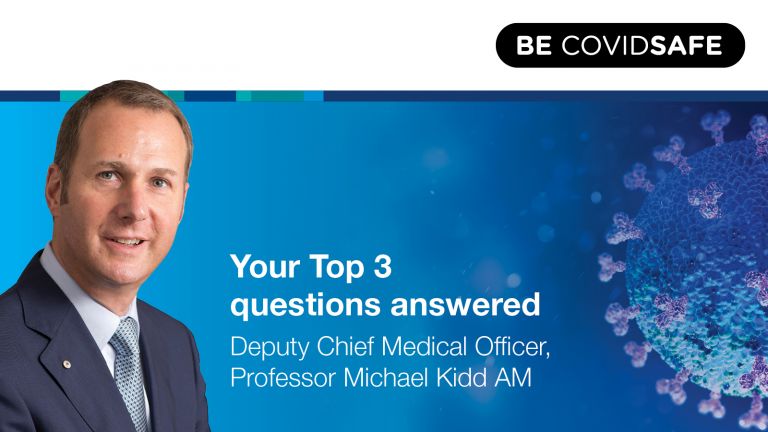
Hello and welcome to today’s Top Three. My name is Michael Kidd, I’m the Deputy Chief Medical Officer with the Australian Government Department of Health. Joining me today is Linda, my Auslan interpreter. So my shout out today is to everybody who has received one or two vaccines of a COVID-19 vaccine. Thank you for what you are doing to contribute towards bringing this pandemic under control in our country. At the moment, we’ve had nearly 28 million doses of COVID-19 vaccines administered to people right across Australia. 77 percent of people aged 16 years and above have had at least one dose of a COVID-19 vaccine and over 53 percent of people have received two doses of a vaccine and so have full protection against COVID-19. So my thanks to everybody who has received two doses of their vaccine, to everyone who has received one dose of the vaccine, to everybody who has an appointment to get a vaccine and to everybody who is planning to get their vaccine. Our COVID-19 vaccines are now available to everybody in Australia aged 12 years and above and there are now nearly 10,000 sites, general practices, pharmacies, state and territory hubs, where you can go and receive COVID-19 vaccines.
Your first question today is, what is the latest advice on booster shots?
There’s been a lot in the media about booster shots for COVID-19, we’ve been following very closely what’s happening in a number of other countries. At the moment, the Australian Technical Advisory Group on Immunisation, ATAGI, is recommending that we focus our efforts on getting as many people in our population vaccinated with their first and second shots of a COVID-19 vaccine. We’re also looking very closely to see if there are some people who may need a third shot of a COVID-19 vaccine in order to receive maximal protection against infection and against becoming seriously unwell if infected with COVID-19. These people who may need a third shot include some people who are immune compromised, who may not have been able to generate a strong response to the initial two doses of the vaccine, and then we’re looking to see if everybody is going to need to have a booster shot at some time in the future to provide ongoing protection against COVID-19. So we’re watching very closely the research both within Australia and from overseas, and we’re also watching the experience from those countries which commenced their vaccine roll out a few months before Australia did, so that we can learn from their experience. But at the moment, as I said at the start, our focus is on getting everybody aged 12 years and above to have the opportunity to have the first dose and the second dose of their COVID-19 vaccine. We’ll keep you updated as we get more information about third doses and boosters.
Your second question is, considering how new they are, are the COVID-19 vaccines still in a trial phase?
Certainly, the development of the COVID-19 vaccines occurred very rapidly last year. We saw many hundreds of different groups in Australia and around the world involved in using existing technology and new technology to develop vaccines to provide protection against COVID-19. Those vaccines went through trials involving volunteers, often many thousands of volunteers involved in trialling those vaccines. By the time the Therapeutic Goods Administration, the regulator of vaccines and other medicines in Australia, is assessing a vaccine for use in Australia, those vaccines have been through their trials and the results of their trials have been published and are widely are known. So those vaccines have completed their trial phase. It doesn’t mean that we don’t continue to follow up what’s happening with the vaccines though. We, of course, are encouraging anyone who has a side effect from the vaccine to have those side effects reported to the Therapeutic Goods Administration as part of our ongoing monitoring of the quality and the safety of the vaccines which are being received by people in Australia. And, of course, there are still trials underway around the world with new vaccines. Indeed, there are nearly 300 vaccines under trial around the world for COVID-19 and some of those may eventually end up being available for use in Australia. And we’re seeing trials underway on the use of vaccines in children under the age of 12. At the moment in Australia, we don’t have vaccines licensed to provide protection to those under the age of 12. So the vaccines that we’re using in Australia have been fully approved by the Therapeutic Goods Administration, their trials have completed. Obviously we’ll continue to watch very closely with new vaccines being developed and also those very important vaccines being investigated for use in children. At the moment, the best protection that we can all provide to Australian children under the age of 12 is for adults and teenagers to get two doses of a COVID-19 vaccine, reducing the risk of the children in our lives being infected with COVID-19.
Your third question is about what qualifies someone as being a close contact or a casual contact of someone with COVID-19?
As the words describe, a close contact is someone who has been in close contact with someone who’s been diagnosed as having been infected with COVID-19. This may be someone who shares your home with you, it may be someone who works alongside you, it may be someone who you have had a prolonged period of being in face-to-face contact with that person, so these are our close contacts. It may also be someone who you’ve occupied an enclosed space with that person for a prolonged period of time, for example if you’ve been on an airline flight with someone who has been diagnosed with COVID-19 or if you’ve been in a health facility or a residential aged care facility with someone diagnosed with COVID-19, or if you’ve been in a school or an early childhood centre with someone diagnosed with COVID-19. These are all examples of close contact. If you are identified as being a close contact then you will need to follow the instructions from the health department in your state and territory about what you need to do about isolation or quarantine, and what you need to do about being tested to see if you have contracted COVID-19. Remember, even people who have received two doses of a COVID-19 vaccine may still be able to be infected by someone through close contact and may still be at risk of transmitting COVID-19 onto other people. The vaccines reduce the likelihood of you being infected or being able to transmit COVID-19 to someone else and, of course, they greatly reduce the risk of you becoming seriously unwell if infected with COVID-19, but they don’t eliminate that risk of being able to be infected or transmit to other people. So that’s a close contact. Now a casual contact is where the contact has not been so direct. So, for example, you may have been to a store or a venue, a sporting venue, an entertainment venue, where there has been transmission of COVID-19. You may not know that you’ve been in direct contact with someone, you may not have even known the person who has been diagnosed with COVID-19, but you may still be identified as being a casual contact and therefore at increased risk of having contracted COVID-19. Again, it’s very important if you are in the casual contact category that you follow the instructions from your state or territory department of health about isolation and the need to get tested to make sure that you haven’t contracted COVID-19. So that’s the difference between a close contact and a casual contact. Obviously, we all need to be doing all we can to reduce the risk of transmission of COVID-19, so please continue to follow the instructions from your state and territory department of health and also the advice from the Australian Government Department of Health. If you have any questions about the risk of being a close or casual contact, please go to your state or territory department of health website or you can contact the national coronavirus helpline on 1800 020 080 for advice about whether you are at risk of being a contact of someone with COVID-19 and what you should do.
And that is our Top Three for today, so thank you for continuing to share your questions with us, it’s really important that we know what questions you have about COVID-19 so that we can help you with some of the answers. Thank you everybody and, as always, thank you to Linda.
Top 3 questions
- What’s the latest advice on booster shots?
- Considering how new they are, are the COVID-19 vaccines still in a trial phase?
- What qualifies someone as a close vs a casual contact?







